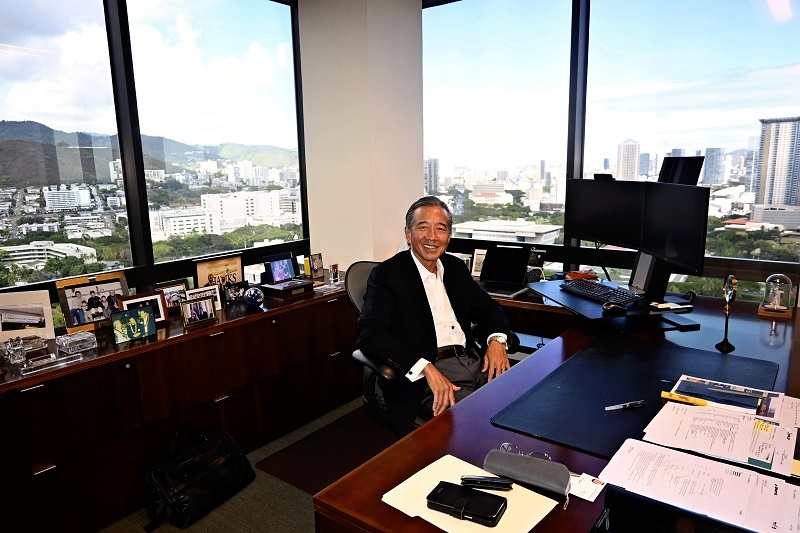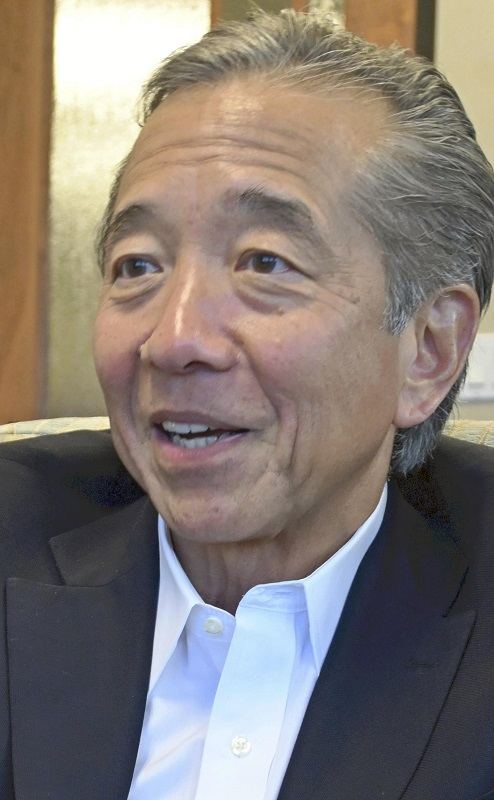Japanese American leaders bridging 2 nations

The Chairman’s office of Central Pacific Bank overlooking Honolulu, Hawaii, USA. The bank was founded in 1954 by second-generation Japanese Americans who were unable to raise funds due to discrimination and prejudice that continued after the war, and who advocated “a bank for all people in Hawaii.” Daniel Inouye, later a U.S. senator, was on the bank’s board of directors at its inception.
7:00 JST, August 28, 2022
The internment of Japanese Americans, which began 80 years ago, has left lessons in U.S. history of “wartime racial discrimination” and “human rights violations.” Some Japanese Americans who had been deprived of their property and jobs and sent to internment camps worked hard to rebuild their lives after liberation, and some became essential political figures. The presence of Japanese American leaders has contributed to the diversification of U.S. society as well as fostering U.S.-Japan relations.
Paul Yonamine, a third-generation Japanese American born and raised in Japan, whose father was Wally Kaname Yonamine, the first postwar foreign player to join a professional baseball team in Japan, feels a sense of crisis over the lack of Japanese American leaders in the U.S. There are approximately 1.5 million Japanese Americans living in the U.S. He spoke about the importance of nurturing the next generation of leaders among them. The following is excerpted from his recent interview with The Yomiuri Shimbun.
“The strength of the U.S. is in its diversity. The experience of Japanese American internment became an invaluable lesson for the country.”
My grandfather was from Okinawa and moved to Maui, Hawaii, in 1905 to work on a farm and seek a better life. At that time, he would have never imagined that a war would break out between Japan and the U.S.
After the attack on Pearl Harbor in December 1941, discrimination and prejudice against Japanese Americans in the U.S. intensified, leading to their internment in 1942. About 120,000 people on the U.S. mainland, mainly on the West Coast, were sent to internment camps. About 2,000 Japanese Americans in Hawaii were also sent to those camps.
The suffering the Japanese Americans experienced was unimaginable. The impact on the second generation of Japanese Americans was especially severe. They were sent to the internment camps even though they were U.S. citizens. To demonstrate their loyalty to the country, about 33,000 second generation Japanese Americans volunteered to serve in the U.S. military. They were sent to the harsh European front, where they suffered many casualties, and demonstrated heroism that enhanced the reputation of Japanese Americans.
From the second generation, we have had leaders such as former U.S. Sen. Daniel Inouye (died in 2012), the first Japanese American member of Congress, and former Secretary of Transportation Norman Mineta (died in May 2022), the first Japanese American cabinet member. The third generation, that I represent, has had fewer visible and prominent leaders. I believe that third-generation Japanese Americans, raised by second-generation parents who experienced internment and racial hardships, were brought up to work hard and excel in their fields but were not necessarily encouraged to take on active and visible leadership roles politically or in business. Further, most were not taught to speak the Japanese language or to learn about their Japanese roots. After a catastrophic World War, these behaviors were understandable.
The strength of the United States lies in its diversity. Although this is accompanied by complexities like racial discrimination, the United States has always made a genuine effort to confront these problems, resolve them and apply their learnings for the future. In the September 2001 terrorist attacks in the United States, the perpetrators were of Arab ethnicity. However, the Arab American community was not subject to incarceration. This was due in part to the painful experience and lessons from the past Japanese American internment. It was the Japanese American community that advocated for “no discriminatory treatment.” Secretary Mineta, who was Secretary of Transportation at the time, opposed more stringent security checks at airports based on race.
“Expectations for the next generation of Japanese Americans to help deepen U.S. – Japan relations”
Even after the war, Japanese Americans and the Japanese were sometimes derogatorily referred to as “Japs.” Sen. Inouye was most proud of the fact that politicians stopped using the term “Japs” after he became a member of Congress.
For the Japanese American community to maintain its identity and presence in the U.S., we need Japanese American leaders that represent our community and are active in our country’s policy making. It is not only for the sake of the Japanese American community. Our community is vital to the diversity dynamics of the United States as all other ethnic communities are.
I hope that there will be many strong Japanese American leaders from our fourth and fifth generation of Japanese Americans. They are self-confident and have that American quality of always “saying what needs to be said.” They don’t shy away from being active and visible. With the popularity of Japanese food, anime and design these days, they are also very interested to learn more about Japan and its culture.
The U.S.-Japan Council, of which I am the chairman of the board, is a nonprofit organization that seeks to strengthen Japan-U.S. relations through people-to-people interaction. We plan to bring 50 young and emerging Japanese American leaders to Japan in October and have them interact with Japanese political and business leaders. They are all under the age of 40, and most are fourth- and fifth-generation.
Japanese companies have been successful in the U.S. in many fields after World War II, from automobiles to consumer electronics. However, the representatives of those Japanese companies generally did not develop close personal relationships with their American counterparts. So, most Americans may know the names of Japanese companies and products but very few of them know the names of specific individuals.
The language and cultural gap that still exists between Japan and the United States can only be bridged through people-to-people, interpersonal relationships. The Japanese American leadership candidates who will visit Japan in October are of Japanese descent and have a better understanding of the cultures and customs of both countries. They may very well be the best individuals to build bridges and create synergy between Japan and the United States. As people-to-people relationships deepen, the hurdles Japanese companies have struggled with in the past, such as differences in language and business practices, will be lessened. Accordingly, supporting their leadership development should be seen as an “investment in the future” that will bring significant benefits not only to the U.S. but also to Japan.
As a Japanese professional baseball player, my father also served as a bridge between Japan and the United States. He contributed to the modernization of professional baseball by bringing to Japan the American style of play, such as the hook slide. When he joined the Tokyo Yomiuri Giants in 1951, there was still a negative view of Japanese Americans. Despite the discrimination, he made positive efforts and was finally embraced by the Japanese fans.
Although I can not compare myself to my father, I have been involved in business between Japan and the U.S. for nearly 30 years and have introduced U.S. technologies to Japan. The strength of the U.S. lies in areas such as finance and software. While at IBM Japan, I localized Watson, an artificial intelligence system developed in the U.S., into the Japanese language and introduced it to Japan. In the information technology (IT) field, Japan was five to six years behind the United States. At that time, if you followed American IT developments and introduced them to Japan, you were almost sure to gain traction.
On the other hand, I believe that Japan is still the best in the world in manufacturing, service and hospitality, and infrastructure. Looking ahead, Japan will see more investments from abroad. If Japanese companies do not embrace global best practices, they will find themselves in a position of weakness to these overseas investors. Japan needs strong leaders that embrace globalization, and with a sense of urgency. With strong leadership, I believe that organizations will change, and the country will change to become even better and stronger.
U.S. President Joe Biden and Prime Minister Fumio Kishida met in May this year in Tokyo. They stated, “we will honor the history, contributions, and cultural traditions of Japanese Americans and engage the next generation of Japanese American leaders in future U.S.-Japan cooperation.” We were impressed by and proud of their reference to the future role of Japanese Americans.
Mr. Biden was a close friend of Sen. Inouye. He also had a deep respect for Secretary Mineta. Prime Minister Kishida has been supportive of the efforts of the U.S.-Japan Council. I am deeply grateful that both leaders are aware of the influence and potential of the future generation of Japanese American leaders.
The U.S.-Japan alliance is vital to the security of East Asia and the promotion of a free and open Indo-Pacific. Further deepening the partnership between the U.S. and Japan will not only create benefits between the two countries but will also contribute globally. The presence and role of Japanese American leaders as a bridge between the two countries will carry even more weight in the future.
— The interview was conducted by Yomiuri Shimbun Los Angeles Correspondent Shin Watanabe.

Paul Yonamine / U.S.-Japan Council Chairman
Chairman and CEO of Central Pacific Bank in Hawaii and a certified public accountant (CPA). He attended international schools in Japan until the age of 17 and then moved to the U.S. for college. He graduated from the University of San Francisco with a degree in accounting. After working for a CPA firm, he served as the president of Hitachi Consulting, IBM Japan, and other notable organizations. He currently serves as an independent board of director member for three Japanese companies, including the Sumitomo Mitsui Banking Corporation.




